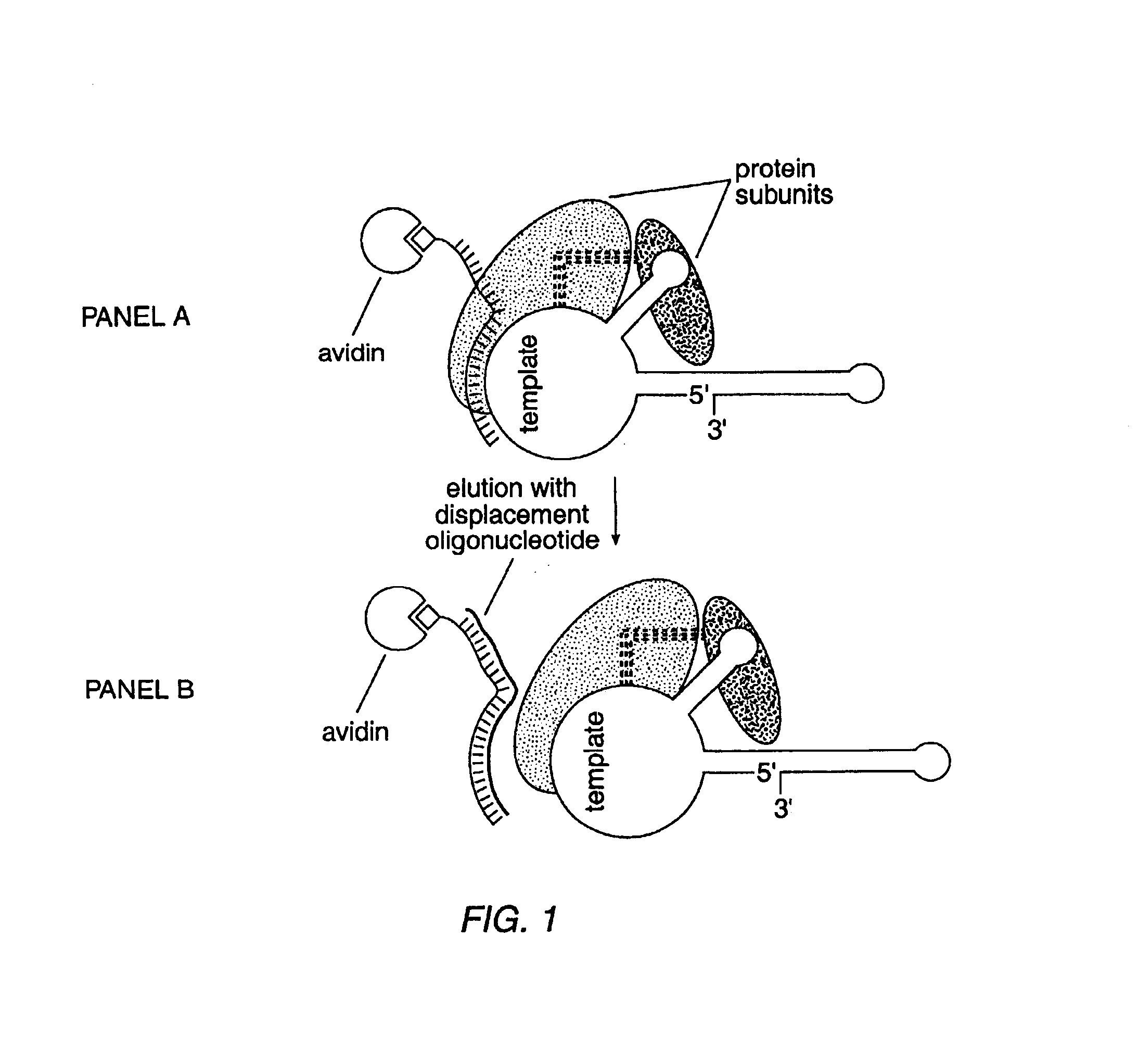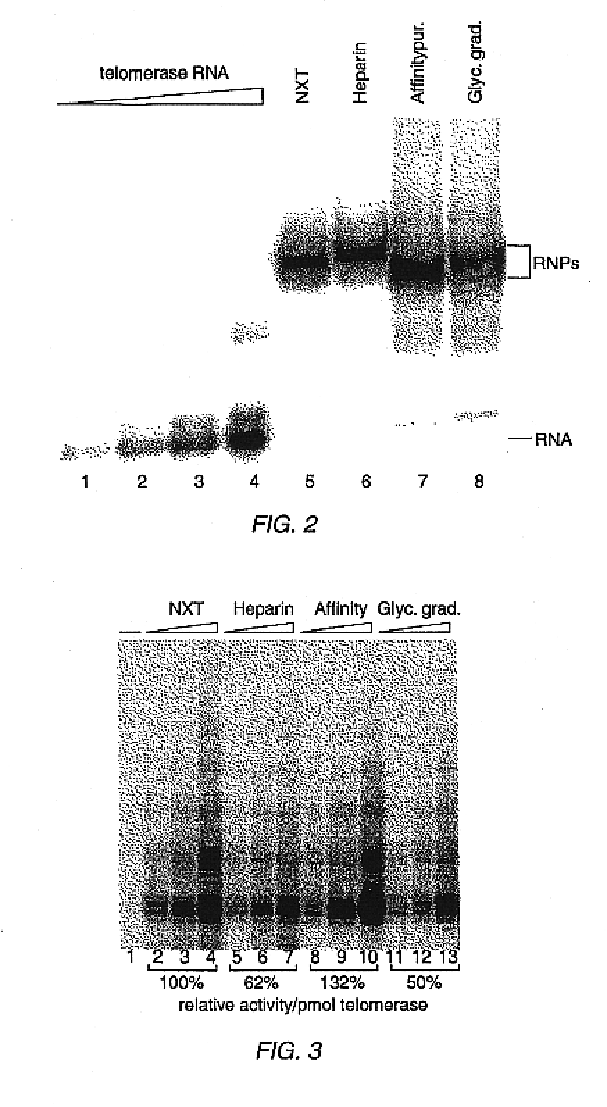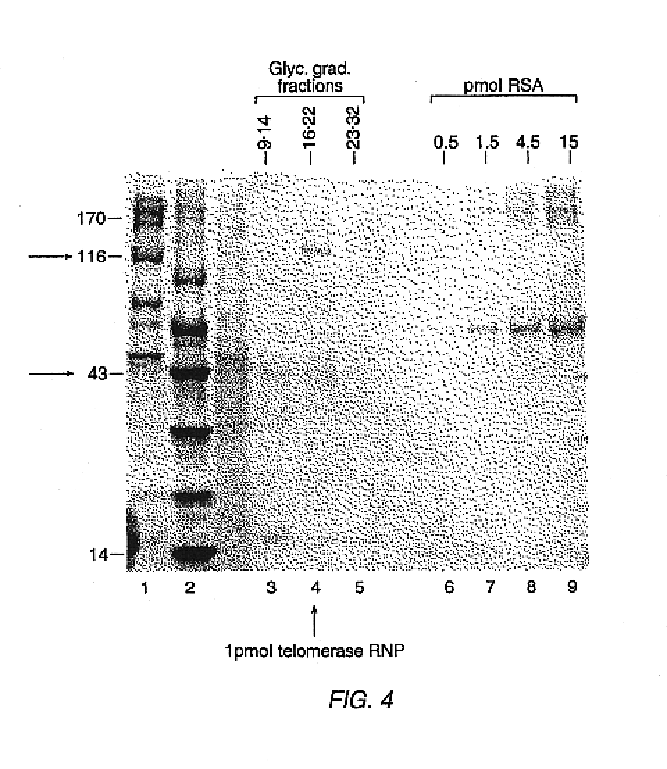Method for detecting polynucleotides encoding telomerase
a polynucleotide and telomerase technology, applied in the field of detecting polynucleotides encoding telomerase, can solve the problems of inability to begin dna synthesis de novo, difficult to identify even loose consensus sequences to describe, and the end of linear eukaryotic chromosome replication presents special problems for conventional methods of dna replication, so as to achieve the effect of easy purification
- Summary
- Abstract
- Description
- Claims
- Application Information
AI Technical Summary
Benefits of technology
Problems solved by technology
Method used
Image
Examples
example 1
Growth of Euplotes aediculatus
In this Example, cultures of E. aediculatus were obtained from Dr. David Prescott, MCDB, University of Colorado. Dr. Prescott originally isolated this culture from pond water, although this organism is also available from the ATCC (ATCC #30859). Cultures were grown as described by Swanton et al., (Swanton et al.,, Chromosoma 77:203 [1980]), under non-sterile conditions, in 15-liter glass containers containing Chlorogonium as a food source. Organisms were harvested from the cultures when the density reached approximately 10.sup.4 cells / ml.
example 2
Preparation of Nuclear Extracts
In this Example, nuclear extracts of E. aediculatus were prepared using the method of Lingner et al., (Lingner et al., Genes Develop., 8:1984 [1994]), with minor modifications, as indicated below. Briefly, cells grown as described in Example 1 were concentrated with 15 .mu.m Nytex filters and cooled on ice. The cell pellet was resuspended in a final volume of 110 ml TMS / PMSF / spermidinephosphate buffer. The stock TMS / PMSF / spermidine phosphate buffer was prepared by adding 0.075 g spermidine phosphate (USB) and 0.75 ml PMSF (from 100 mM stock prepared in ethanol) to 150 ml TMS. TMS comprised 10 mM Tris-acetate, 10 mM MgCl.sub.2, 85.5752 g sucrose / liter, and 0.33297 g CaCl.sub.2 / liter, pH 7.5.
After resuspension in TMS / PMSF / spermidinephosphate buffer, 8.8 ml 10% NP-40 and 94.1 g sucrose were added and the mixture placed in a siliconized glass beaker with a stainless steel stirring rod attached to an overhead motor. The mixture was stirred until the cells ...
example 3
Purification of Telomerase
In this Example, nuclear extracts prepared as described in Example 2 were used to purify E. aediculatus telomerase. In this purification protocol, telomerase was first enriched by chromatography on an Affi-Gel-heparin column, and then extensively purified by affinity purification with an antisense oligonucleotide. As the template region of telomerase RNA is accessible to hybridization in the telomerase RNP particle, an antisense oligonucleotide (i.e., the "affinity oligonucleotide") was synthesized that was complementary to this template region as an affinity bait for the telomerase. A biotin residue was included at the 5' end of the oligonucleotide to immobilize it to an avidin column.
Following the binding of the telomerase to the oligonucleotide, and extensive washing, the telomerase was eluted by use of a displacement oligonucleotide. The affinity oligonucleotide included DNA bases that were not complementary to the telomerase RNA 5' to the telomerase-sp...
PUM
| Property | Measurement | Unit |
|---|---|---|
| molecular weight | aaaaa | aaaaa |
| molecular weight | aaaaa | aaaaa |
| Tm | aaaaa | aaaaa |
Abstract
Description
Claims
Application Information
 Login to View More
Login to View More - R&D
- Intellectual Property
- Life Sciences
- Materials
- Tech Scout
- Unparalleled Data Quality
- Higher Quality Content
- 60% Fewer Hallucinations
Browse by: Latest US Patents, China's latest patents, Technical Efficacy Thesaurus, Application Domain, Technology Topic, Popular Technical Reports.
© 2025 PatSnap. All rights reserved.Legal|Privacy policy|Modern Slavery Act Transparency Statement|Sitemap|About US| Contact US: help@patsnap.com



